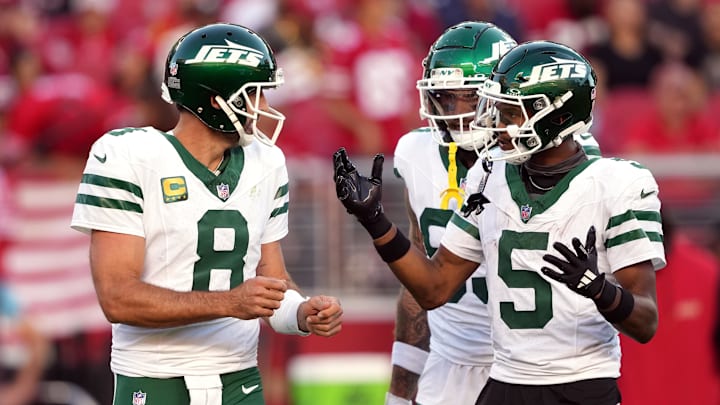Aaron Rodgers, Jets Closer to Finding Out Who They Really Are

At some point, the idea gets twisted. After watching Tom Brady turbo-boost the Tampa Bay Buccaneers and Matthew Stafford actualize the almost-there Los Angeles Rams, there became this market over-correction with devastating consequences. The Cleveland Browns joined forces with Deshaun Watson and cemented the worst (and, not for nothing, the most morally repugnant) trade in NFL history. The Denver Broncos sold out for Russell Wilson which, not for nothing, was maybe the funniest trade in NFL history. Those teams are either currently eating—or preparing to find a way not to digest—some of the largest sums of dead money ever conceived. It’s going to take a long time to clean out the detritus both literal and emotional.
The Browns and Broncos have come to realize that these moves don’t work unless everything else is already aligned and the due diligence on the player is perfect. Personnel. Processes. Coaching. Disaster management. Quarterbacks are critical and essential but they are rarely mystics capable of transforming an entire building into what it is not, or what it has never been.
And so, at the back end of this frenzy, we have a New York Jets team that went all-in on Aaron Rodgers. It wasn’t as costly from a financial or draft equity perspective and should not be mentioned in the same breath as Watson or Wilson in terms of heft or import. But there was an ideological toll and an inherent risk for a team that historically deals in high-wire heartbreak.
Rodgers gave the Jets something it has lacked for entire human generations—a respectable quarterback that could possibly limit the snickering and snap the rest of the roster in line. In return, they pledged their undying support, willing to live with his age, his potential decline, his offense, some of the players he prefers to play with and that feeling of standing out on a cliff amid strong winds, accepting the fly-or-plummet nature of a decision like this.
Monday’s 32–19 loss to the San Francisco 49ers gave the Jets their first real glimpse of what that life might look like; the first sensation of falling and wondering whether or not there’s a parachute in the bag.
It’s difficult to make any sweeping conclusions because the task was gargantuan when we really think about it: Take a roster comprised of a 40-year-old quarterback and two 33-year-old tackles, a recovering No. 2 wide receiver and a still-absent edge rusher and ship (most of) them across the country to face a team that has been more efficient than a NASCAR pit crew for most of the last decade and played in the Super Bowl a few months ago. Their coach, Kyle Shanahan, used to employ the Jets’ coach, Robert Saleh, which we could surmise was an advantage. The 49ers have a larger number of talented skill position players and a deeper defense, though not by much.
Once you clear out the positives—that Rodgers did lead a rollicking, near-flawless touchdown drive to grab an early lead and looked somewhat spry in the process—it did not go well. The Jets had one of the worst rushing success rates in the NFL this week. They dropped passes and found themselves pancake flat underneath Jordan Mason, the 49ers’ Christian McCaffrey emergency plan, who logged 147 yards on 28 carries. And so began the pangs of what the Jets did not have to feel last year when Rodgers was rehabbing a torn Achilles and everyone was still allowed to dream of what was possible when he finally came back to fix everything like all those other soothsaying quarterbacks do.
To be clear, we should never fault the Jets for trying. This was a trade they had to make. But now that it’s happening, what will it reveal about the team as it was constructed? In the dream, Sauce Gardner and Garrett Wilson—former offensive and defensive rookies of the year—Quinnen Williams and C.J. Mosley, Breece Hall … how could it not all come together seamlessly? How could it fail?
In reality, there was a marked difference between the teams the Jets aspire to compete against through making a trade for Rodgers and the team the Jets currently are. For now, the Jets can simply call it a setback. They can reason that plenty of good teams lost in Week 1, which is always a high-variable event thanks to having months to prepare for a single opponent. They can affix their concentration on clubbing the Tennessee Titans and New England Patriots in back-to-back weeks—a highly probable event—and getting a groove back.
They can still dream that the Rodgers trade was made in the same spirit as Brady and Stafford—the final brushstrokes of a truly great work—and not Wilson or Watson. But the dawn is coming and, soon, the Jets will receive an unobscured look in the mirror. What will the team find?
